Questões de Concurso
Comentadas para analista do banco central - área 2
Foram encontradas 60 questões
Resolva questões gratuitamente!
Junte-se a mais de 4 milhões de concurseiros!
Em um SGBD, em que a separação entre os níveis conceitual e interno são bem claras, é utilizada a linguagem ....I.... , para a especificação do esquema interno. Onde a separação entre os níveis interno e conceitual não é muito clara, o SGBD possui um compilador que permite a execução das declarações para identificar as descrições dos esquemas e para armazená-las no catálogo. Neste caso utiliza-se a ....II.... . No SGBD, cuja arquitetura utiliza os esquemas conceitual, interno e externo, é necessária a adoção da ....III.... .
Preenchem correta e respectivamente as lacunas I, II e III:
I - O problema de seleção adversa reside no fato de o mercado gerar apenas incentivos para pessoas ou firmas de baixo risco adquirirem apólices de seguro.
II - No mundo real, as escolhas de mercado, como qualquer outra decisão, são feitas com informação incompleta, de modo que a realidade do conheci- mento imperfeito não é uma falha de mercado.
III - O problema da assimetria de informação só emerge quando o comprador potencial, ou o vendedor potencial, tem uma informação importante para a transação que a outra parte não tem.
É correto APENAS o que se afirma em
 , as variáveis X são chamadas independentes; as colunas de X são ditas linearmente independentes e os elementos de
, as variáveis X são chamadas independentes; as colunas de X são ditas linearmente independentes e os elementos de  , por hipótese, são distribuídos independentemente. Com relação aos significados de independência usados acima, pode-se afirmar que
, por hipótese, são distribuídos independentemente. Com relação aos significados de independência usados acima, pode-se afirmar queI - os
 são independentemente distribuídos para que se possam estimar os parâmetros
são independentemente distribuídos para que se possam estimar os parâmetros pelo método de mínimos quadrados;
pelo método de mínimos quadrados;II - as variáveis X são ditas independentes porque não dependem de y;
III - as colunas de X são linearmente independentes para que essas variáveis não sejam correlacionadas.
É correto o que se afirma em
 , caracterizada por um processo autorregressivo de ordem um [AR(1)]:
, caracterizada por um processo autorregressivo de ordem um [AR(1)]: 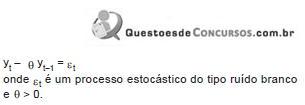
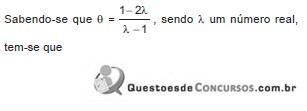
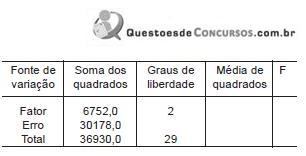
Analisando a tabela ANOVA acima, considere as conclusões a seguir.

É correto APENAS o que se conclui em
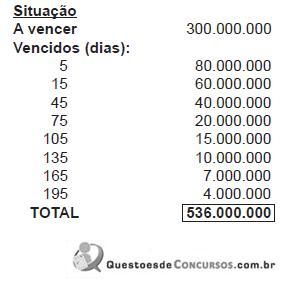
Devem ser considerados, também, os níveis de risco determinados pelo Banco Central e os respectivos percentuais para cálculo da provisão para créditos de liquidação duvidosa.
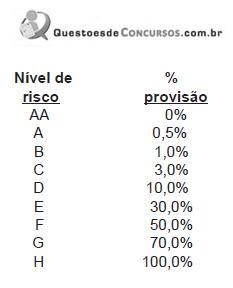
A partir dessas informações, qual a provisão para créditos de liquidação duvidosa e a respectiva contabilização?

Considerando essas informações, o valor da conta Participação dos Minoritários, no balanço consolidado, foi, em reais, de